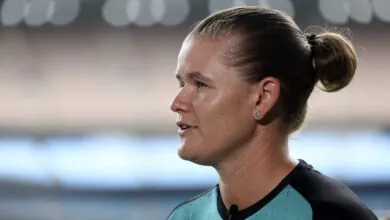Paul Dyson looks at those who made their debuts in 1870 as well as one player whose career came to an end.
The first inter-county match of 1870 saw ‘Ted’ Butterfield make his first-class debut at Trent Bridge against Nottinghamshire. He opened the batting in the first innings but scored only eight and 10 and never played at that level again. An amateur, he was a solid opening batsman in club cricket; born in Keighley in 1848, he played for his home town club for ten years and died there in 1899 at the age of 50.
That match had begun on June 23rd and four days later Yorkshire handed debuts to three more players, these being for the meeting with Surrey at Bramall Lane. With match-figures of eight for 74 Robert Clayton made a big impact on his debut but did not have the career which was hoped for him. It was said that the county captain, Tom Emmett, felt that he did not think enough about each batsman’s weaknesses. In his ten-season career for Yorkshire he played in 70 matches, scoring 992 runs and taking 153 wickets, including 13 five-fors, with his fast and medium-fast bowling. His career-best was eight for 66 against Lancashire at Old Trafford in 1877 and his full first-class career included 33 games for MCC as well as 16 matches for various teams representing the North. Originally thought to have been born in Caley, Otley in 1844, his birthplace was in Wales – Penygroes in Camarthenshire, to be precise. After retirement he remained on the Lord’s groundstaff, where he had been since 1872 and was awarded a benefit match (Married v Single) there in 1892. He was also involved in both umpiring and coaching. His umpiring in first-class cricket lasted 25 seasons from 1876 and included five years in the Championship. He died in Gainsborough, in 1901 aged 56, where he had lived for over 20 years.
David Eastwood was born at Lascelles Hall, Huddersfield, in 1848 and played for the fanous club of the same name. His career with Yorkshire lasted over eight seasons but he played in only five of those, being a regular just in 1876 and 1877 when he scored all of his three half-centuries. He might have played more for the county had his fielding been better but he was good enough to represent the North on three occasions and also the Players. In his 29 matches for Yorkshire he scored 591 runs and took 11 wickets with his slow-medium bowling. From 1871 he had a four-year spell with Sunderland during which time he played for both Durham and Northumberland. Other clubs included Heckmondwike and Elland and he coached at Oxford University from 1893 to 1897. He was also a first-class umpire around this time and stood in the Championship in 1895. At the time of his death, in Sheepbridge, Huddersfield in 1903 he was landlord of the New Inn, Bradford Road, Huddersfield.
The third debutant in the Surrey match was Seth Waring; he made nine in his only innings and so it was also the last match of his career. He was born in 1838 in the hamlet of Billingley now in Dearne, Rotherham but spent most of his life in Keighley, where he died in 1919 at the age of 80, having begun to play for that town’s club when just 18. He was offered several professional engagements by different clubs but remained with Keighley and his time there included 12 seasons as captain and he scored over 3,400 runs and took more than 500 wickets as well as being secretary for four years from 1873. An authentic one-club cricketer.
Yorkshire’s next game was on July 21st against Kent, at Gravesend, and it was significant for Ashley Walker in that it was the last of his nine appearances for Yorkshire which had stretched back to the county’s first season of 1863. Born in Bradford in 1844, he was in the first eleven at Westminster School for three seasons and gained a Blue in each of his three years at Cambridge from 1864. He top-scored in the University match of 1865 and his career-runs for Cambridge include all of his three half-centuries. An amateur, he played for Yorkshire Gentlemen but scored only 138 runs for Yorkshire at an average of below 10. However, he left his mark on the game in Asia: he worked in education in Ceylon (now Sri Lanka) for 25 years from 1876 also helping to establish cricket on the island, especially at Royal College, and twice captained teams on tours to India. He returned to England and died in Harrold, Bedfordshire, in 1927 when aged 84. Not one who made an impact for Yorkshire but a true pioneer of the game.
The return match with Kent took place at Dewsbury four days later and was the stage for William Dawson to repeat the experiences of Butterfield and Waring but in a much more ignominious manner. His only match for Yorkshire saw him bat at numbers 10 and 11, make a pair and for him not to be called on to bowl though he did take a catch. Another amateur, he was born in Bradford in 1850 and played in the 1st XI at Marlborough in 1869 before going up to Cambridge where he gained a Blue in athletics. A good sportsman, he played rugby for Bradford and Yorkshire. Other cricket teams included Bradford and Leeds Clarence. He died in Ilkley in 1916 when aged 65.




